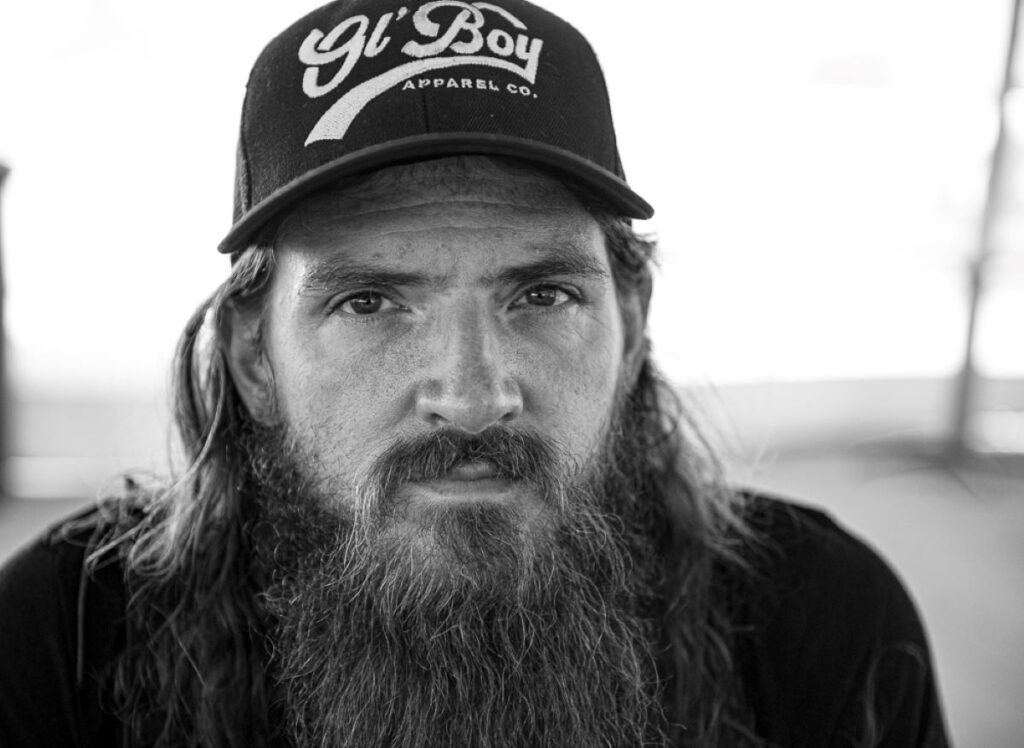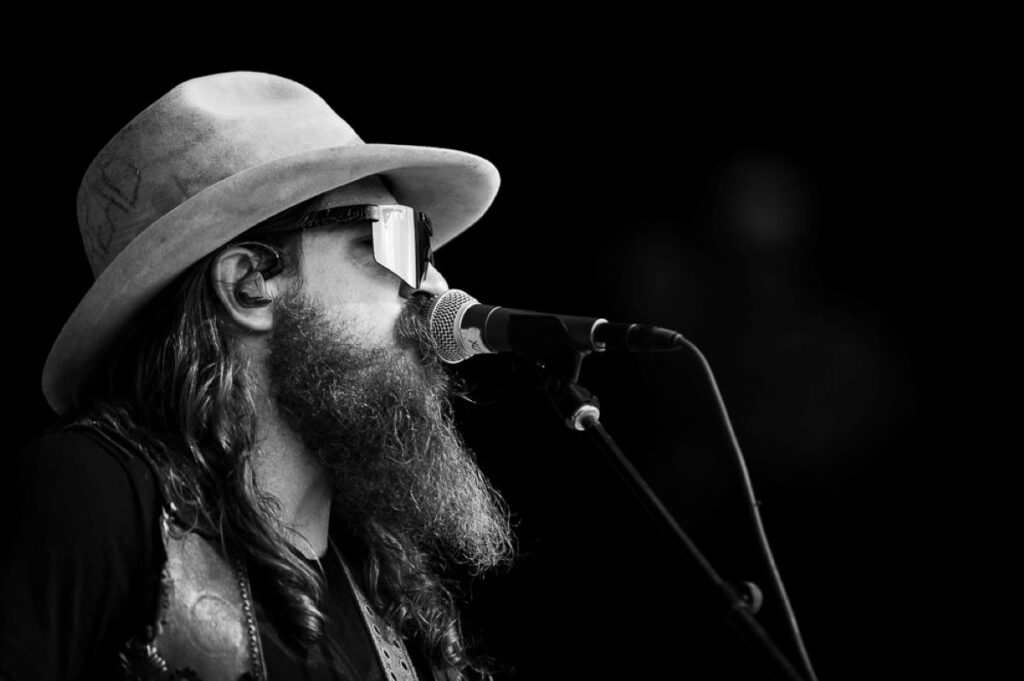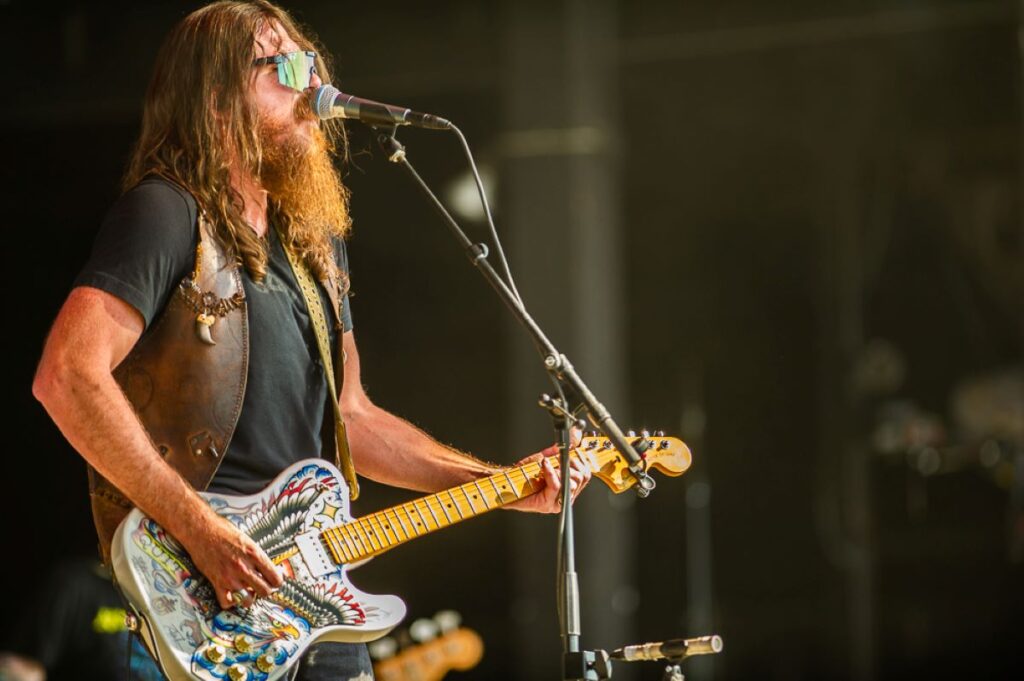
It’s been a grind, turning this writing and photography side hustle of mine into something real. Like the artist who lands in Nashville full of grit, ready to work their way up Music Row. Or the one who goes to Austin to dwell and ramble among the outliers, in the hopes of one day becoming a country music outlaw. It’s the love of what you do that gives you the will to get on stage night after night. To put in the effort when it’s not easy. To see your dreams when no one else can.
I got to interview Tim Montana at the Born And Raised Festival this past September of 2022. Tim’s tour manager, Tom reached out to me a couple of days before the event and asked if I’d be willing to conduct an interview with Tim after his set on the first day. I did not hesitate to say yes. Even though I hadn’t conducted an interview since my college journalism class. You can’t turn down opportunities like that. I was doing it.
I had rented a high-end lens for the photography I was going to be doing for the festival. I opted for a fixed focal length 300mm lens at a 2.8 aperture. I chose this lens for several reasons. One, I didn’t know how far the photographers would be from the stage. The 300mm would give me plenty of reach. The 2.8 aperture would give me plenty of low light performance whether I was dealing with harsh shadow during the day. Or the high contrast of shooting the artist’s sets with the stage lighting after dark. I chose the right piece of glass for the festival. The only mistake I made however was that I took no test shots with the lens before the festival started. It took me a moment to find my footing with that lens. Tim’s performance was during the day. There was lots of shadow, but I ended up getting a couple of photos during Tim’s set that I was real pleased with. There was one shot I especially liked. It ended up being my favorite.

We were going to conduct the interview after Tim’s performance in the press tent. I didn’t have a lot of time to prepare for it. But I didn’t want to just wing it either. I thought to myself about what a music festival is, and what it means to see a favorite singer, singing a favorite song. Especially in the times in which we live. I believe we can come together and just dig on the good music. That’s not something cliched. But in these days, as real and important as anything. If the person in the crowd next to you has a different set of beliefs than you do. Just think to yourself how cool it is to be into the same music. Maybe a good concert can be the beginning of that. Or maybe it’s a re-beginning? I think there was a time when that did exist. Life is short, and the intention of going to a concert and having a good time is never time that’s wasted. That was what I wanted to achieve with the interview perhaps more than anything else.
I got the text after the show that they were ready to go for the interview. I made my way down there. When I walked in the tent I was greeted by Tim and his tour manager Tom. They both immediately stood up and reached out to shake my hand when I walked up to them. Which was cool. It gave me the impression that these guys were down to earth. That they were sincere. Legitimate.
I thanked them for the opportunity and sat down and got started. Tom said goodbye, and I said to Tim that I would keep the interview brief. I thought that was the best thing to do. The interview was finished just after seven minutes.
Me: How did you get your start?
Tim: Do you just want me to tell you the story of my upbringing and all of that?
Me: Yeah.
Tim: I grew up off the grid in Montana, and I didn’t really know my dad. He died when I was real young. But recently I did the whole Twenty Three And Me thing and found all of these nephews and nieces, and one of them is a record producer. I texted him and said “hey, it’s your Uncle Tim”. He texted me back and said, “Yeah! give me minute! I didn’t know you existed until about five minutes ago!”” I was on my way back from a music video shoot and Kentucky, and got to thinking, maybe it’s a genetic thing. I’ve got these nieces and nephews that are artists too. They were all related to my dad…… I didn’t really get to know my dad. It’s definitely in the blood.
Me: I read that you went to L.A for a while?
Tim: I did. I went from Elk Park Montana to Hollywood. That was a culture shock. It was my first experience with electricity in about seventeen years. I grew up with no power up there in the middle of the woods.
Me: Where did you live, like in North Hollywood?
Tim: I lived right behind the Chinese Theatre on Hollywood Boulevard. I lived off of Sycamore Terrace where Guns N Roses used to live. So I had this nasty ass little apartment that I could barely afford, and raised a lot of hell down in Hollywood for a couple of years.
Me: I lived out in L.A briefly. I was an actor, but ran out of money so fast.
Tim: I’ve been dabbling in that as well, I’ve got a couple of roles in westerns they’ve been shooting in Montana.
Me: What movies?
Tim: I did “The Last Son” with Machine Gun Kelly. Sam Worthington’s in it. I did “Murder In Yellowstone City.” It had Richard Dreyfuss. Tom found me that part.
Me: Have you ever tried to get into Yellowstone?
Tim: I’ve been circling that camp for a long time, and now they’re filming near my home town in Butte. My buddy Robert Patrick is on there. He said they’ll make you shave your beard and cut your hair. I thought I don’t know about that. Maybe if they find a role for a mountain man hillbilly. I might get in.
Me: I noticed you were playing a Telecaster out there. Is that your favorite?
Tim: Yeah. I’ve played Fenders since I was a kid. I’ve got a relationship with those guys, and they designed that guitar for me I was playing out there, and I’ve always been a big Waylon Jennings fan.
Me: Why are you an artist? Was that something you had to do?
Tim: Yeah, I knew I was either going to go work in the mines in Butte or play guitar. I chose to play guitar. The guitar was just something I gravitated to. I could listen to songs on the radio and figure it out on the guitar.
Me: Next question. This is not a political question at all. But it’s the reason I wanted to do this article. Do you think music has the potential to bring us back together? To give this country a sense of unity again?
Tim: Yeah, I think so. I’m not a big fan of artists talking politics on stage even though I tour with a lot of artists that do talk politics on stage. I’m not mad at them by no means. It’s their right to do that. But I think it’s a nice relief when people try to get away from that stuff. If you can’t say it in a song. Maybe don’t say it. And that goes for both sides of the fence.
Me: This is another question kind of like the last. Despite the turmoil of the times. Do you still think it’s alright to have a good time?
Tim: Yeah! I think it’s absolutely OK to have a good time.
Me: For someone who is unfamiliar with country music. Give me three singers or bands they should listen to.
Tim: Waylon Jennings. ZZ Top. ZZ top is not really country but they’ve had a lot of influence on me. I think Chris Stapleton. He’s kind of the dude.

Me: Do you ever get tired of being on the road?
Tim: It’s not the road. It’s just getting harder to leave home. I have four kids, aged 1 and a half to fourteen, and getting on the bus can be dreadful. But after about two hours I turn into a road beast. I got my CDL and sometimes drive the bus. So after a while I can turn into that road creature I have inside of me. That kind of “highway pirate”, if you will. But it’s not the road that’s hard. It’s leaving the kids. But we try to bring them out as much as possible.
Me: Last question. If you knew that in one year from now you would be dead? How would you spend that last year?
Tim: Being in the mountains of Montana somewhere. That’s my heaven.
To be honest. I researched Tim more after the interview than I did before it. There’s nothing I could write that couldn’t easily be found on a Google search. But after all the information I found, this is my favorite: Tim performing a song called “Butte Montana” on the David Letterman show back in 2008. At the end of the song, Letterman comes over to greet the band. He walks up to Tim and shakes his hand. He asks Tim, “How’s your family?” Tim says “awesome”, then points out to them sitting in the audience.
I thought that was alright.
